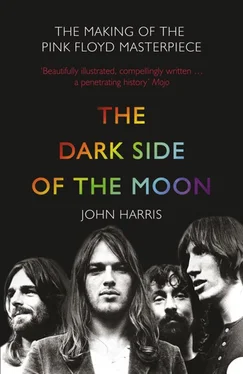In January 1968, the five-man incarnation of Pink Floyd played four shows, in Birmingham, Weston-Super-Mare, and the Sussex towns of Lewes and Hastings. Aubrey Powell clearly recalls seeing at least one of those shows, and quickly succumbing to absolute bafflement. ‘Syd wasn’t doing anything really,’ he says. ‘He was just sitting on the front of the stage, kicking his legs. It was very, very odd.’
‘My initial ambition was just to get them into some sort of shape,’ Gilmour later recalled. ‘It seems ridiculous now, but I thought the band was awfully bad at the time when I joined. The gigs I’d seen with Syd were incredibly undisciplined. The leader figure was falling apart, and so was the group.’
It did not take long for Pink Floyd to bow to the inevitable. In David Gilmour’s recollection, Barrett’s ejection from the group was confirmed as they drove from London to an engagement in Southampton. ‘Someone said, “Shall we pick up Syd?”’ he later remembered, ‘and someone else said, “Nah, let’s not bother.” And that was the end.’
So it was that Pink Floyd dispensed with the figure on whose talents their reputation had been built. ‘We carried on without a second thought,’ says Nick Mason. ‘It didn’t occur to us that it wouldn’t work. In retrospect, I find that very curious.’
CHAPTER 2 CHAPTER 2 Hanging On in Quiet Desperation: Roger Waters and Pink Floyd Mark II CHAPTER 3 And If the Band You’re in Starts Playing Different Tunes:The Dark Side of the Moon Is Born CHAPTER 4 Forward, He Cried from the Rear: Into Abbey Road CHAPTER 5 Balanced on the Biggest Wave: Dark Side, Phase Three CHAPTER 6 And When at Last the Work Is Done: The Dark Side of the Moon Takes Off Appendix Us and Them: Life After The Dark Side of the Moon Keep Reading Конец ознакомительного фрагмента. Текст предоставлен ООО «ЛитРес». Прочитайте эту книгу целиком, купив полную легальную версию на ЛитРес. Безопасно оплатить книгу можно банковской картой Visa, MasterCard, Maestro, со счета мобильного телефона, с платежного терминала, в салоне МТС или Связной, через PayPal, WebMoney, Яндекс.Деньги, QIWI Кошелек, бонусными картами или другим удобным Вам способом. Bibliography/Sources Acknowledgements Index About the Author About the Publisher
Hanging On in Quiet Desperation CHAPTER 2 Hanging On in Quiet Desperation: Roger Waters and Pink Floyd Mark II CHAPTER 3 And If the Band You’re in Starts Playing Different Tunes:The Dark Side of the Moon Is Born CHAPTER 4 Forward, He Cried from the Rear: Into Abbey Road CHAPTER 5 Balanced on the Biggest Wave: Dark Side, Phase Three CHAPTER 6 And When at Last the Work Is Done: The Dark Side of the Moon Takes Off Appendix Us and Them: Life After The Dark Side of the Moon Keep Reading Конец ознакомительного фрагмента. Текст предоставлен ООО «ЛитРес». Прочитайте эту книгу целиком, купив полную легальную версию на ЛитРес. Безопасно оплатить книгу можно банковской картой Visa, MasterCard, Maestro, со счета мобильного телефона, с платежного терминала, в салоне МТС или Связной, через PayPal, WebMoney, Яндекс.Деньги, QIWI Кошелек, бонусными картами или другим удобным Вам способом. Bibliography/Sources Acknowledgements Index About the Author About the Publisher
Roger Waters and Pink Floyd Mark II CHAPTER 2 Hanging On in Quiet Desperation: Roger Waters and Pink Floyd Mark II CHAPTER 3 And If the Band You’re in Starts Playing Different Tunes:The Dark Side of the Moon Is Born CHAPTER 4 Forward, He Cried from the Rear: Into Abbey Road CHAPTER 5 Balanced on the Biggest Wave: Dark Side, Phase Three CHAPTER 6 And When at Last the Work Is Done: The Dark Side of the Moon Takes Off Appendix Us and Them: Life After The Dark Side of the Moon Keep Reading Конец ознакомительного фрагмента. Текст предоставлен ООО «ЛитРес». Прочитайте эту книгу целиком, купив полную легальную версию на ЛитРес. Безопасно оплатить книгу можно банковской картой Visa, MasterCard, Maestro, со счета мобильного телефона, с платежного терминала, в салоне МТС или Связной, через PayPal, WebMoney, Яндекс.Деньги, QIWI Кошелек, бонусными картами или другим удобным Вам способом. Bibliography/Sources Acknowledgements Index About the Author About the Publisher
With Barrett gone, the creative leadership of Pink Floyd initially seemed to be up for grabs. The first recorded work they released in the wake of his exit was Rick Wright’s almost unbearably whimsical ‘It Would Be So Nice’, a single whose lightweight strain of pop-psychedelia – akin, perhaps, to the music of such faux-counterculturalists as the Hollies and Monkees – rendered it a non-event that failed to trouble the British charts; as Roger Waters later recalled, ‘No one ever heard it because it was such a lousy record.’ Waters’s own compositional efforts, however, were hardly more promising. ‘Julia Dream’, the single’s B-side, crystallized much the same problem: though the band evidently wanted to maintain the Syd Barrett aesthetic, their attempts sounded hopelessly lightweight.
As 1968 progressed, though Rick Wright continued to add songs to the group’s repertoire, it was quickly becoming clear where power now lay: with Roger Waters, the figure who, even when Barrett was around, had always had pretensions to being the band’s chief. ‘From day one, he always seemed to be the leader of the band,’ says Aubrey Powell. ‘He had a commanding presence. He could be quite brusque – rude .’
‘Roger was always the organizational person,’ says Peter Jenner. ‘If I wanted anything done, I had to fix Roger. He always had the good ideas: he always knew what he wanted to do. He was the bossy one: the one I had to persuade, always, because he could also be obstructive. He was the strongest personality in that sense.’
If such a character sketch suggests a mind with pretensions to omnipotence, Jenner also saw weaknesses in Waters’s initial contribution to the band: his apparently stunted musical talent, and his failure to satisfy the Underground’s codes of cool. ‘Roger was the worst musician,’ he says. ‘He couldn’t tune his guitar, he was tone deaf, and he also had some of the most awful sartorial things when they started becoming psychedelic. The worst thing were these red trousers that he put some dingly-dangly gold trim on, along the bottoms: the kind of thing you put on curtains. And he had a cigarette lighter in a sort of holster, dangling from his belt. He was terribly [naff], Roger. Terribly naff. But he thought he was groovy.’
Despite their friendship, the differences between Waters and Syd Barrett had tended to make them look like the occupants of completely different worlds. Barrett’s ’67-era personality was detached, non-materialistic, increasingly astral; Waters, by contrast, affected a hard-headed drive. One had become a living embodiment of sixties counterculture; the other chose to guardedly keep his distance. Perhaps most tellingly of all, whereas Barrett’s drug intake was disastrously prodigious – not simply in terms of his fondness for acid, but also when it came to marijuana and the downer Mandrax – Waters was a drinker who rarely consumed anything illicit.
Читать дальше












